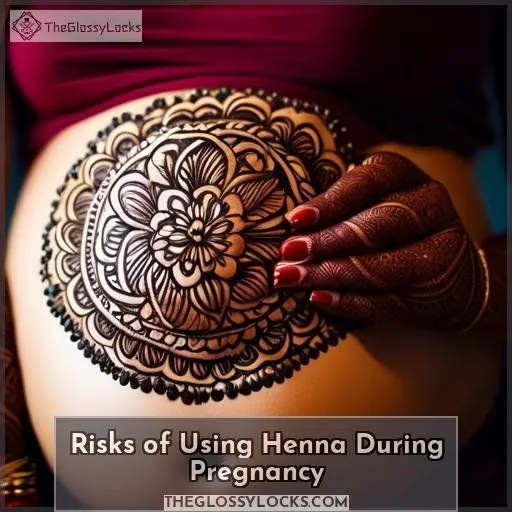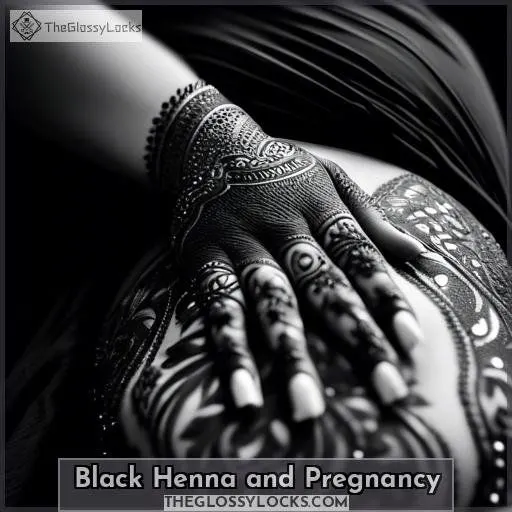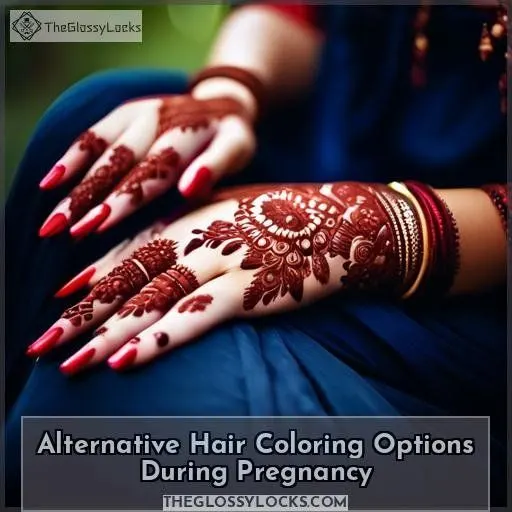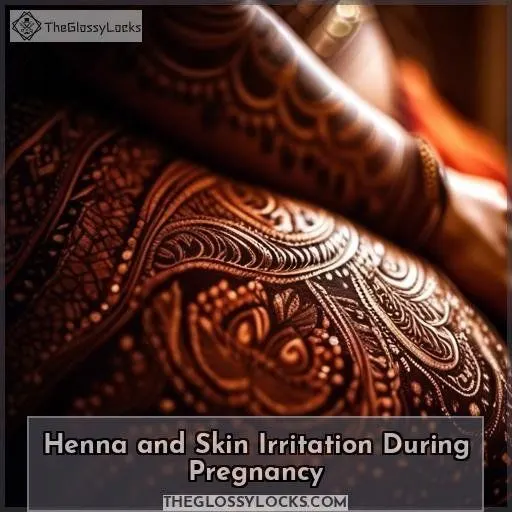This site is supported by our readers. We may earn a commission, at no cost to you, if you purchase through links.
You can henna your hair while pregnant, but exercise caution.
Natural, high-quality henna is generally safe.
Always patch test first and avoid products containing harsh chemicals.
Henna offers a plant-based, semi-permanent coloring option that may be safer than chemical dyes.
However, be wary of black henna which contains potentially harmful ingredients.
Proper application is key—don’t overheat, stop if dizzy, and stick to reputable brands.
Taking these precautions allows you to safely experiment with henna hair color during pregnancy.
For a more thorough guide on safe coloring practices, continue below.
Table Of Contents
- Key Takeaways
- Can I Henna My Hair While Pregnant?
- Safe Henna for Pregnancy
- Precautions for Using Henna During Pregnancy
- Benefits of Using Henna During Pregnancy
- Risks of Using Henna During Pregnancy
- Black Henna and Pregnancy
- Natural Henna and Pregnancy
- Salon Considerations for Henna During Pregnancy
- Alternative Hair Coloring Options During Pregnancy
- Henna and Skin Irritation During Pregnancy
- Seeking Medical Help With Henna During Pregnancy
- Conclusion
Key Takeaways
- Always exercise caution when hennaing your hair while pregnant, opting for natural, high-quality henna and avoiding products containing harsh chemicals.
- Perform a patch test before use and avoid black henna, which contains para-phenylenediamine (PPD) and can cause severe side effects.
- Proper application is crucial; avoid overheating, stop if you feel dizzy, and stick to reputable brands.
- Consider alternative hair coloring options, such as semi-permanent colors or natural plant-based dyes, to ensure safety during pregnancy.
Can I Henna My Hair While Pregnant?
Yes, it’s safe to henna your hair while pregnant. However, it’s recommended to use all-natural henna and avoid black henna, which contains para-phenylenediamine (PPD), a substance that can cause skin irritation and allergic reactions. It’s also advisable to perform a strand test 24 hours before coloring to check that your hair reacts normally during pregnancy.
Safe Henna for Pregnancy
When thinking about henna for hair color during pregnancy, it’s important to know the safety and precautions involved.
While henna is generally safe to use, it’s essential to test it on a small area of skin 24 hours before using it.
Avoid using too much heat during application.
Additionally, natural henna can provide semi-permanent color and comes in different shades.
However, be careful of black henna, which contains para-phenylenediamine (PPD) and can cause severe side effects.
Always read product labels carefully and talk to a professional for advice if needed.
Precautions for Using Henna During Pregnancy
When adorning yourself with henna during pregnancy, it’s imperative to exercise caution to safeguard the well-being of both the mother and the infant. Here are some guidelines to heed:
- Scrutinize product labels meticulously: Verify that the henna you employ is unadulterated and devoid of additives or chemicals that could potentially jeopardize the developing child.
- Conduct a patch test 24 hours prior to application: Apply a diminutive amount of henna to an inconspicuous area of your skin to ascertain any adverse reactions or irritations.
- Mitigate overheating during henna application: Excessive heat can intensify dizziness, so ensure you apply henna in a temperate environment and avoid prolonged exposure to the sun.
- Discontinue application if experiencing dizziness or shortness of breath: Should you encounter any symptoms of dizziness or labored breathing while applying henna, cease immediately and seek medical attention.
- Henna and blood pressure: Physiological shifts during pregnancy can induce a decrease in blood pressure, which may lead to dizziness. Be cognizant of this and implement appropriate measures to avert fainting.
- Don gloves: To minimize the likelihood of cutaneous irritation or allergic reactions, always don gloves when applying henna.
- Seek medical counsel: If you harbor any concerns regarding the use of henna during pregnancy, it’s prudent to consult a healthcare professional for tailored advice.
Benefits of Using Henna During Pregnancy
There are some potential benefits to using natural, body-safe henna during pregnancy. Henna, derived from plants, may be a safer option than chemical hair dyes that contain ammonia or other harsh ingredients which could potentially be absorbed into your body and potentially harm you or your baby.
Henna Safety During Pregnancy
Yes, you can henna your hair while pregnant. Henna is a natural product derived from plants and is safe for use during pregnancy. However, it’s essential to take precautions. Here are some tips:
- Henna Patch Tests: Always do a 24-hour patch test before using henna.
- Product Labeling: Read product labels thoroughly to confirm safety.
- Application Duration: Henna paste takes several hours to set, and the stain lasts between one and three weeks.
- Pregnancy Precautions: Avoid overheating during application and stop if you feel dizzy or short of breath.
Alternative Hair Coloring Options
After examining henna’s safety, let’s delve into alternative hair coloring choices. Semi-permanent colors, featuring reduced chemical composition, are highly popular. They’re similar to a pleasant surprise in a beauty store, providing a more secure refuge during pregnancy and breastfeeding. Natural plant-based dyes and self-tanners also offer a gentle palette for skin.
Risks of Using Black Henna
Black henna isn’t safe for use during pregnancy. It contains para-phenylenediamine (PPD), a chemical that can cause severe allergic reactions, dermatitis, and even blisters. Consequently, pregnant women should refrain from using black henna to color their hair or skin.
Risks of Using Henna During Pregnancy
Using henna during pregnancy can pose some risks.
Henna compatibility with hair type, application techniques, and dye longevity can vary, which may lead to scalp sensitivity or hair breakage.
It’s important to do a patch test 24 hours before use and avoid overheating during application.
If you feel dizzy or short of breath, stop the application immediately.
Pure henna is generally safe, but it’s vital to use high-quality, authentic henna from a reputable brand to avoid impurities or chemical contamination.
Black henna, which contains para-phenylenediamine (PPD), is not safe for use during pregnancy and can cause severe side effects, including dermatitis, blisters, and allergic reactions.
Black Henna and Pregnancy
Black henna, which contains para-phenylenediamine (PPD), can cause severe side effects.
These include dermatitis, blisters, and allergic reactions.
It is illegal in the UK for direct use on the skin.
Using black henna may also cause skin pain and long-term damage.
PPD may sensitize the skin to other PPD-containing products, leading to further irritation.
If you experience skin irritation after using black henna, seek medical attention immediately.
Natural Henna and Pregnancy
While natural henna is generally safe for use during pregnancy, it’s important to exercise caution.
Henna can be used as a hair dye or on the skin, often combined with lemon juice and essential oils.
However, it’s crucial to read product labels carefully, conduct a patch test, and avoid overheating during application.
Henna can impart semi-permanent hair coloration in various shades, but it may not be as organic as perceived and could contain metallic compounds.
It’s also noteworthy that henna cannot be removed, cannot be dyed over, and may cause hair breakage if used before salon procedures.
Furthermore, henna may not be suitable for breastfeeding mothers or individuals with sensitive skin, as it can cause scalp irritation and hair damage.
Salon Considerations for Henna During Pregnancy
If you’re considering henna hair coloring during pregnancy, it’s essential to be aware that most respectable salons don’t carry or use henna products. Henna is incompatible with chemical salon services, and utilizing it could potentially prevent future hair treatments at a salon or lead to hair breakage if applied before such services.
Henna Safety
Absolutely, you can henna your hair while pregnant! Henna is a natural product derived from plants and is generally considered safe for use during pregnancy. Here are some key points to check out:
- Henna is a safe alternative to chemical hair dyes and provides semi-permanent color.
- It’s important to read product labels carefully and do a patch test 24 hours before use.
- Henna can be mixed with lemon juice and essential oils for skin dye, but be sure to avoid overheating during application.
- Henna isn’t as natural as it seems, as some brands may contain metal compounds. Always choose a reputable source for your henna.
Alternative Coloring Options
During pregnancy, selecting hair coloring options compatible with your changing body is vital. Henna, a natural plant-based alternative to chemical hair dyes, is a popular choice among pregnant women. However, it’s imperative to be aware of the risks and precautions associated with using henna during pregnancy.
Firstly, henna is generally deemed safe for use during pregnancy. It’s a natural product derived from plants and has no adverse effects on the mother or baby. Henna can be used harmlessly by children, and it’s often used as a skin dye that leaves an orange stain that turns brown. However, it’s essential to use natural henna, as black henna may contain para-phenylenediamine (PPD), which can cause severe side effects, including dermatitis, blisters, and allergic reactions. Black henna is illegal in the UK for direct use on skin and can lead to skin pain and long-term damage.
When using natural henna, it’s important to take some precautions. Carefully read product labels, do a patch test 24 hours before use, avoid overheating during application, and stop application if you feel dizzy or short of breath. Henna paste takes several hours to set, and the stain lasts between one and three weeks.
If you have concerns about the safety of henna during pregnancy, there are alternative hair coloring options available. Demi-permanent hair color with no ammonia is a safer choice. These products have a low chemical odor, minimal absorption into the body, and are available at beauty supply stores. They gradually wash out, providing a semi-permanent color.
Salon Considerations
Salon Considerations for Henna During Pregnancy
When contemplating henna for hair coloration during pregnancy, there are several salon-related factors to contemplate:
- Henna Availability: Respected salons may not stock henna, as it’s incompatible with chemical salon treatments.
- Henna Removal: Henna can’t be effectively eradicated, which may preclude future salon hair treatments.
- Henna Hair Damage: If henna is applied prior to salon treatments, hair breakage may ensue.
- Henna Chemical Composition: While henna is a natural product, it may contain metal compounds that can interact with chemical hair dyes, potentially causing damage or discoloration.
- Henna Skin Irritation: Certain individuals may experience skin irritation after applying henna, which could be more pronounced during pregnancy.
When visiting a salon, it’s imperative to discuss your preferences and concerns with your stylist. They can provide guidance on the most suitable hair coloring options for your specific needs and circumstances.
Alternative Hair Coloring Options During Pregnancy
During pregnancy, it’s crucial to explore alternative hair coloring options that are safe for both you and your baby. While henna is generally safe for use during pregnancy, it may not be the ideal choice for everyone. Here are some alternative hair coloring options to explore:
- Semi-permanent hair color: These products have fewer chemicals and are less likely to irritate the skin. They’re also simpler to remove if necessary.
- Low chemical scent: Seek out hair coloring products with minimal odor, which can be more pleasant during pregnancy.
- Minimal absorption into the body: Opt for hair dyes that are less likely to be absorbed into the body, reducing potential risk to the baby.
- Available at beauty supply stores: Many pregnancy-safe hair dyes can be found at local beauty supply stores, making them convenient to acquire.
- Fades gradually: Some semi-permanent hair colors fade over time, allowing for a natural look without the need for harsh chemicals.
Henna and Skin Irritation During Pregnancy
Embarking on the henna odyssey during pregnancy, you’re venturing into a realm of natural beauty with a dash of prudence.
While organic henna bestows a myriad of pregnancy perks, it’s imperative to navigate the treacherous waters of black henna, which poses pregnancy hazards, including extreme skin reactions.
Before you embark, heed the wisdom of a patch test to banish uninvited guests like skin irritation.
And though salons may shun henna, adhering to these pregnancy precautions guarantees your henna journey is both secure and resplendent.
Seeking Medical Help With Henna During Pregnancy
- Doctor’s Advice: If you experience any discomfort, joint pain, discharge, or bleeding while using henna during pregnancy, seek immediate medical attention.
- Possible Reactions: If you have had an adverse reaction to henna before pregnancy or to certain medications or hair dyes, refrain from using henna during pregnancy.
- Black Henna: Black henna should be avoided, especially in individuals with a history of adverse reactions to henna, certain medications, or hair dyes.
- Henna Dermatitis: If you suspect that your henna contains additives, it may cause dermatitis. In such cases, consider seeking medical advice to guarantee your safety and that of your unborn child.
Conclusion
Ultimately, while you can henna your hair while pregnant, exercising extreme caution is paramount. Always opt for high-quality, natural henna and meticulously patch test. Avoid black henna containing harmful chemicals. Heed your body’s signals, discontinue if dizzy, and only use respected brands. With appropriate safeguards, henna offers a potentially safer semi-permanent coloring option during this vulnerable time.














